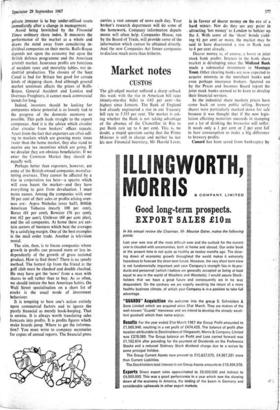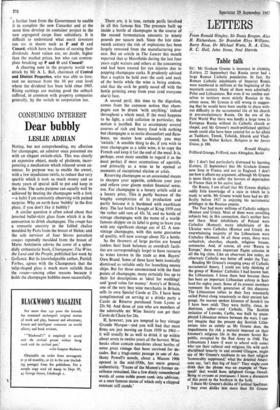Market notes
CUSTOS
The gilt-edged market suffered a sharp setback this week with the rise in American bill rates (ninety-one-day bills) to 4.63 per cent—the highest since January. The Bank of England had already engineered a rise in our Treasury bill rate to 5.355 per cent. The market is ask- ing whether the Bank is not taking advantage of the absence of the Chancellor in Rio to put Bank rate up to 6 per cent. This is, no doubt, a stupid question seeing that the Prime Minister is still in charge and neither he nor his new Financial Secretary, Mr Harold Lever,
is in favour of dearer money on the eve of a hard winter. Nor do they see any point in attracting 'hot money' to London to bolster up the f. With some of the 'short' bonds yield- ing 61 per cent or more, the market may be said to have discounted a rise in Bank rate to 6 per cent already.
Dearer money is, of course, a boost to joint stock bank profits. Interest in the bank share market is developing since the Midland Bank made a substantial investment in Montagu Trust. Other clearing banks are now expected to acquire interests in the merchant banks and even perhaps insurance brokers. Spurred on by the Prices and Incomes Board report the joint stock banks seemed to be keen to develop their financial services.
In the industrial share markets prices have come back on some public selling. Brewery shares were particularly marked down for sale because it was thought that if the now legis- lation affecting motorists succeeds in stamping out a lot of drinking the breweries will suffer. It needs only a 1 per cent or 2 per cent fall in beer consumption to make a big difference to brewery profits.
Cunard has been saved from bankruptcy by a further loan from the Government to enable it to complete the new Cunarder and at the same time develop its container project in the new segregated cargo liner subsidiary. It is difficult to understand what merit investors can see in shares such as P and 0 and Cunard, which have no chance of earning their dividends. Asset values are, no doubt, higher than the market prices, but who can contem- plate breaking up P and 0 and Cunard?
A cheering note in the property world was struck by Mr A. L. Ball, chairman of Central and District Properties, who was able to fore- cast an increase from the 10 per cent level where the dividend has been held since 1965. Rising earnings are making good the setback suffered, in common with property companies generally, by the switch to corporation tax.







































 Previous page
Previous page